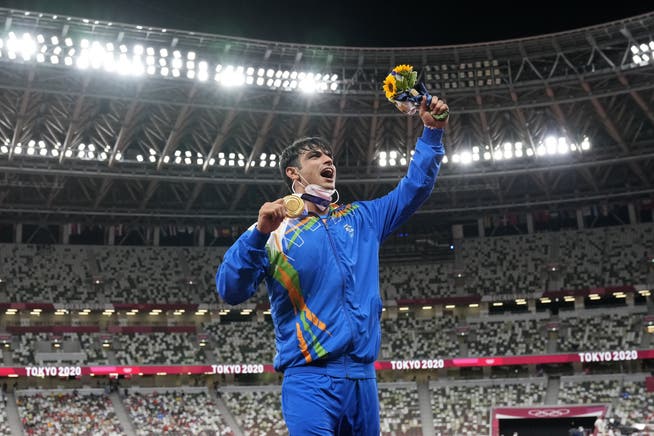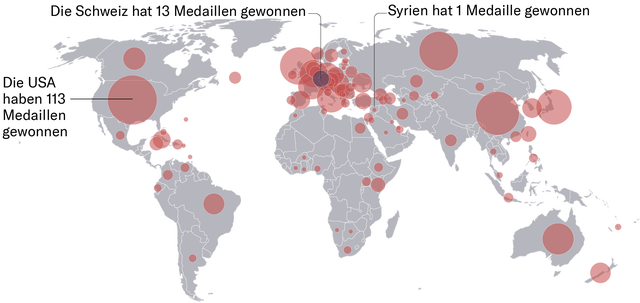The Northern Hemisphere countries have won the most Olympic medals. Africa and large parts of Asia are underrepresented in the medal table in terms of population.
Canoeist Jessica Fox has won one of 17 gold medals for Australia.
At the Olympic Games in Tokyo 339 sets of medals were awarded, which is 1080 times the precious metal. The Olympics are meant to be a global sports festival, but medals are distributed unevenly. Answers to selected questions about the medal table.
Why is the South underrepresented on the medal table?
Of the 1080 medals in Tokyo, only 124 went to countries from the southern hemisphere. This is primarily due to the fact that about 90 percent of the world’s population lives in the northern hemisphere.
Australia tops the medal table in the Southern Hemisphere. On the other hand, Australia is a country with a tradition in Olympic sports. On the other hand, Australia has the highest GDP per capita in the Southern Hemisphere.
Brazil ranks second in the medal table in the south, and the factor for its success is not its economic strength per capita, but its large population. Brazil has the fifth largest population in the world with 211 million. As against, Brazil won relatively few medals.
New Zealand in third place, like Australia, is a country with a high GDP per capita. Kenya and Uganda in the other courses are strongholds for long and medium distance runners. These countries have won their medals in their “specialties”.
Do densely populated countries have an advantage?
China, the most populous country in the world, ranks second in the medal table after the USA, which has the third largest population in the world.
Not only does China have a population of over 1.4 billion people, but it also has a government funding system for top athletes. This is reflected in the medal table. China won 50 medals in Atlanta in 1996, twice as many in Beijing in 2008 and 88 in Tokyo. In the recent past, China ranked second only to the United States.
The pool of talented athletes is of course larger in more populous countries, but this alone is not a factor of success. India has the second largest population with just under 1.4 billion people. Indian athletes have won seven medals less in Tokyo than in Switzerland. Neeraj Chopra’s javelin gold medal was only the tenth in history.

Despite the second largest population: Javelin thrower Neeraj Chopra won the 10th gold medal in the sport’s history of India.
One of the reasons for the poor medal return for Indians is the lack of strategies and structures to promote the sport. This is what Indian sociologist Balbir Singh Ulach told Deutschlandfunk. In addition, a third of the population lives in poverty and does not have or have difficulty accessing sports. And: India has a great sporting tradition in cricket – but the sport is not Olympic.
A large population is not enough for Olympic success, it also requires economic strength, structures, and traditions. The most populous nations of Pakistan (208 million / rank 6) and Bangladesh (164 million / rank 8) did not win any medals in Tokyo.
Is high GDP the success factor?
Switzerland won as many medals in Tokyo as it did in Helsinki in 1952. Switzerland has the second highest GDP per capita after Luxembourg and can afford to finance a top-tier sport. 41% of Swiss athletes completed the top RS in Tokyo. Even shooter Sina Kristen (gold and bronze) and Linda Indergand (mountain bike bronze) are part-timers in the military.
Among the world’s ten largest economies, seven also appear in the top ten in the medal table, with the exception of India, Canada and South Korea.
However, if you look at the number of medals per billion in GDP, the major industrialized countries are no longer in the top positions. In this arrangement, for example, San Marino, Grenada or Jamaica presented more possibilities. Switzerland ranks 59th in this ranking and the United States of America 87th out of 93 countries.

“Internet nerd. Avid student. Zombie guru. Tv enthusiast. Coffee advocate. Social media expert. Music geek. Professional food maven. Thinker. Troublemaker.”







More Stories
Why isn’t England competing in the Olympics, but Great Britain?
Basketball star James carries the American flag at the start of the Olympic Games.
Best Athletics in Lucerne – Kampondji, Kalin, Lobalu and Moser win in Lucerne – Sports